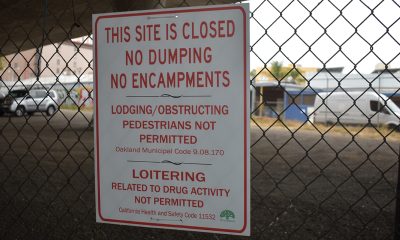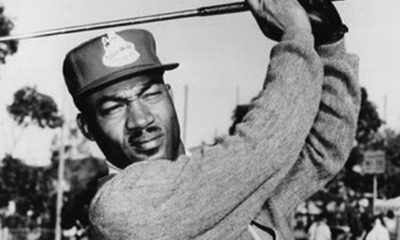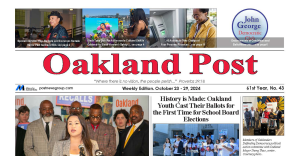Op-Ed
Endless Plastic Bags Smother Planet Earth

By Bill Fletcher, Jr.
NNPA Columnist
Maybe it has always been like this. If so, I am not sure precisely what triggered my new concern. But in either case, there seems to be an exceptional amount of plastic on highways, streets, in bushes, etc. It is mainly in the form of used plastic bags.
I became aware that it was entering my consciousness a few weeks ago. I was driving and noticed that there was a lot of trash along a major road in my neighborhood. I noticed that, day after day would pass and it would still be there. But it was not only in my neighborhood.
I started wondering whether it was just a matter of the wind, that all of this plastic was around. That there were wind-tunnels created and the plastic bags were accumulating. I have not been able to figure it out, exactly, but I have come to a few conclusions.
The most obvious is that, as individuals, many of us simply do not care about the planet. When we are finished with something, such as a plastic bag, we are content to let it drop and float away. The second conclusion is that we are increasingly witnessing the impact of the destruction of the public sector. There are fewer city, county and state workers to take care of our streets and roads. More often than not, I see groups of prisoners dressed in their bright, orange attire, doing clean-up. Other times I see no one.
A third conclusion is that we live in a society that creates so much waste and really does not know what to do with it. So, these plastic bags fly around, after we have used them, and start to wrap themselves around trees. I am sure that you have seen this. And they smother the trees over time. Or, they fly into the rivers, ponds, and lakes, eventually making it into the ocean, to be consumed by sea life that can never digest them and, therefore, die. Yet, most of us act more as if it is nothing more than a nuisance rather than a sign of collapse.
The solution goes far beyond recycling, as important as that step actually is. It is really about priorities. What sorts of packaging should we use? Yes, maybe some packaging will cost a little more, but so what? Yes, when we get tired of something, we should restrain ourselves from just dropping it where we want, whether it is a plastic bag or a toxic waste dump.
So, when you are driving down the road and see those plastic bags smothering the trees or when they get stuck to the bottom of your car so that you are forever smelling burnt plastic, remember that this is a symptom of a society that has said, in so many words, we do not care what comes next.
Bill Fletcher, Jr. is the host of The Global African on Telesur-English. He is a racial justice, labor and global justice activist and writer. Follow him on Twitter, Facebook and at www.billfletcherjr.com.
###
Bay Area
In the City Attorney Race, Ryan Richardson Is Better for Oakland
It’s been two years since negotiations broke down between the City of Oakland and a developer who wants to build a coal terminal here, and the issue has reappeared, quietly, in the upcoming race for Oakland City attorney. Two candidates are running for the position of Oakland City Attorney in November: current Assistant Chief City Attorney Ryan Richardson and retired judge Brenda Harbin-Forte.

By Margaret Rossoff
Special to The Post
OPINION
It’s been two years since negotiations broke down between the City of Oakland and a developer who wants to build a coal terminal here, and the issue has reappeared, quietly, in the upcoming race for Oakland City attorney.
Two candidates are running for the position of Oakland City Attorney in November: current Assistant Chief City Attorney Ryan Richardson and retired judge Brenda Harbin-Forte.
Richardson has worked in the Office of the City Attorney since 2014 and is likely to continue current City Attorney Barbara Parker’s policies managing the department. He has committed not to accept campaign contributions from developers who want to store and handle coal at a proposed marine terminal in Oakland.
Retired Judge Harbin-Forte launched and has played a leading role in the campaign to recall Mayor Sheng Thao, which is also on the November ballot. She has stepped back from the recall campaign to focus on her candidacy. The East Bay Times noted, “Harbin-Forte’s decision to lead the recall campaign against a potential future client is … troubling — and is likely to undermine her ability, if she were to win, to work effectively.”
Harbin-Forte has refused to rule out accepting campaign support from coal terminal interests or their agents. Coal terminal lobbyist Greg McConnell’s Independent Expenditure Committee “SOS Oakland” is backing her campaign.
In the 2022 mayor’s race, parties hoping to build a coal terminal made $600,000 in contributions to another of McConnell’s Independent Expenditure Committees.
In a recent interview, Harbin-Forte said she is open to “listening to both sides” and will be “fair.” However, the City Attorney’s job is not to judge fairly between the City and its legal opponents – it is to represent the City against its opponents.
She thought that the 2022 settlement negotiations ended because the City “rejected a ‘no coal’ settlement.” This is lobbyist McConnell’s narrative, in contrast to the report by City Attorney Barbara Parker. Parker has explained that the City continued to negotiate in good faith for a settlement with no “loopholes” that could have allowed coal to ship through Oakland – until would-be coal developer Phil Tagami broke off negotiations.
One of Harbin-Forte’s main priorities, listed on her website, is “reducing reliance on outside law firms,” and instead use the lawyers working in the City Attorney’s office.
However, sometimes this office doesn’t have the extensive expertise available that outside firms can provide in major litigation. In the ongoing, high stakes coal litigation, the City has benefited from collaborating with experienced, specialized attorneys who could take on the nationally prominent firms representing the City’s opponents.
The City will continue to need this expertise as it pursues an appeal of the judge’s decision that restored the developer’s lease and defends against a billion-dollar lawsuit brought by the hedge fund operator who holds the sublease on the property.
Harbin-Forte’s unwillingness to refuse campaign contributions from coal terminal interests, her opposition to using outside resources when needed, as well as her uncritical repetition of coal lobbyist McConnell’s claim that the City sabotaged the settlement talks of 2022 all raise serious concerns about how well she would represent the best interests of Oakland and Oaklanders if she is elected City Attorney.
Commentary
Opinion: “McDonald” Trump Goes Off (Color) on Arnold Palmer. Plus, Blacks and Filipinos Link at Jazzed-Up Buffalo Soldiers Tribute
After manning the fry station in Bucks County, what will “McDonald Trump” do next? The Palabok and Chicken Joy at the Philadelphia Jollibee for the Filipino vote? Unlikely.

By Emil Guillermo
After manning the fry station in Bucks County, what will “McDonald Trump” do next? The Palabok and Chicken Joy at the Philadelphia Jollibee for the Filipino vote?
Unlikely.
But there’s a reason for everything the candidates do now. For example, Trump’s recent reference to Arnold Palmer’s manhood. I’ll explain.
We are in full campaign stunt mode. Candidates, it seems, would do anything to grab what’s left of the still-undecided-yet-persuadable voters.
The candidates are resorting to what I call “fracking” for votes. It’s where candidates inject hot liquid rhetoric deep down into the electorate at high pressure to create fissures, openings, hoping to loosen things up to allow extraction–not for oil or gas–but for those hard-to-get voters.
So, Trump went fast food for some fast votes, but Harris topped him, saying she’d work to change the federal minimum wage from $7.25 so that service workers could afford a decent life. What’s Trump offering? Extra ketchup?
Last week, Trump was in Latrobe, the birthplace of the great golfer Arnold Palmer. At a campaign event, he elevated Palmer and the girth of his manhood into the 2024 campaign rhetoric.
It was crude and unpresidential. But Trump’s a convicted felon, who has been found liable of sexual assault and defamation in a civil court and has lied repeatedly on just about everything. After the Access Hollywood tape of 2016 where he crudely talked about grabbing women by their p—y, how would he top it in 2024? Trump used Palmer to “frack” for votes among undecided men, suburban women, Blacks, and Latinos.
OAKLAND MUSEUM’S FILIPINO AMERICAN HISTORY TRIBUTE
I went to a unique celebration at the Oakland Museum last weekend.
John Calloway, jazz musician and San Francisco State music lecturer, presented his live multi-media experience on Buffalo Soldiers and the Philippine American War to a packed theater.
Calloway’s grandfather John W. Calloway was a Buffalo Soldier, the Army’s regiment of Black soldiers who served in the Philippines in the 1890s. He also reported on the war for the Black press, notably the Richmond Planet. While the mainstream press insisted on the colonization of the Philippines and its savage people, John W. Calloway’s compassionate writings showed how Filipinos were anything but savages.
It was a two-way street. Through the Buffalo Soldiers, Filipinos learned about American culture and the difference between white and Blacks. “The colored soldiers do not push us off the streets, spit on us, call us damn niggers, abuse us in all manner of ways, and connect race hatred with duty,” a Filipino interviewee told John W. Calloway.
He concluded, “The future of the Filipino I fear, is that of the Negro of the South.”
He said no one has any scruples regarding the rights of the Filipino, who is kicked. cuffed at will, drawn up and degraded before their eyes, cast into prison after prison, stripped and searched time and again, humiliated, brutalized.
It was one of the best Filipino American History Month celebrations I have ever attended. Enough facts and all the feels.
Get tickets to the show here: https://themarsh.org/monday-night-marsh-stream/
About the Author
Emil Guillermo is a journalist and commentator. See his micro-talk show on www.patreon.com/emilamok. He performs an excerpt from his Emil Amok Monologues, “Transdad,” Nov. 4 and 18th at the Marsh, 1062 Valencia St, San Francisco.
Activism
OP-ED: Slogans Over Solutions: The Real Cost of Defunding the Police
Let’s be blunt: Defund the Police is not just a failure—it’s a farce. Consider Oakland’s much-hyped MACRO program, designed to respond to 911 calls without armed officers. In theory, it was supposed to lighten the police’s load and ensure that non-violent incidents were handled by social workers. In practice, it’s a bureaucratic disaster. Nearly all of its service recipients are homeless, and a mere 6% of calls result in meaningful help. The cost to taxpayers? Nearly $3,000 per referral.

By Dr. Jennifer Tran
It’s time to cut through the slogans and set the record straight on the “Defund the Police” movement. What started as a rallying cry, borne out of real pain and injustice, has become a case study in misguided policy, political opportunism, and unintended consequences. It is, in fact, a lesson in the tragic comedy of American politics, where grand gestures replace practical solutions, and the impulsive dreams of self-serving politicians only succeed in plunging cities into chaos. And the communities that were supposed to benefit from these reforms? They’re the ones paying the steepest price.
To understand how we got here, let’s rewind the tape to 2013, when the Black Lives Matter (BLM) movement emerged in response to horrific instances of police brutality. The deaths of Black men and women at the hands of law enforcement rightly shocked the public, and for once, there was a reckoning with the systemic inequities that had long plagued the American criminal justice system. It wasn’t just theory anymore, buried in the pages of university texts. Viral videos of police brutality turned those academic arguments into raw, painful reality for millions. People were outraged, and rightly so. We demanded change.
Then came 2016, when Oakland’s Anti-Police Terror Project decided the solution to police violence was to cut the police budget by 50%. In a utopia where crime doesn’t exist, maybe that could work. But on the streets of America, where real people face real threats, the idea was nothing short of delusional. The group, bankrolled by millions from the Akonadi Foundation and its president Lateefah Simon, pushed to slash Oakland’s police budget in half and divert the funds to social services. Sounds noble in theory. A better society, they promised, lay just beyond the horizon—one where cops were obsolete and violence simply evaporated once social workers entered the scene. But there’s a reason serious policy experts dismissed this as fringe from the start—it was.
And then, the murder of George Floyd in 2020 gave this once-fringe movement a national megaphone. “Defund the Police” became the rallying cry for protests that swept across the country. City councils from Oakland to New York City fell over themselves to slash police budgets in response to activist pressure. Progressive politicians saw an opportunity to appease their activist base by passing “bold” policies, irrespective of the practical consequences.
But herein lies the rub. Defunding the police is not a policy—it’s a moral pose, an empty chant masquerading as a solution. What exactly did anyone think would happen when cities with already strained police forces began gutting their budgets? Did they think crime would simply cease? That communities terrorized by violence would find comfort in knowing that more mental health workers were on call while fewer officers patrolled their neighborhoods?
The reality struck like a hammer. When police officers, demoralized by public scorn and abandoned by their city leaders, began resigning in droves, crime spiked. Homicides, carjackings, and robberies surged in cities like Oakland, while the communities that supposedly stood to benefit from defunding were left more vulnerable than ever. In fact, it became clear that the only people who thrived in this brave new world were the criminals.
What’s worse, the political damage was catastrophic. Not only did the Defund movement fail to deliver on its promises, but it handed Republicans a golden opportunity to paint Democrats as reckless and soft on crime. In the 2020 elections, the backlash was evident as Democrats struggled to shake off the taint of these disastrous policies. What could have been a serious conversation about police reform—about how to make law enforcement both effective and accountable—was hijacked by the extremists who would rather tear it all down.
Let’s be blunt: Defund the Police is not just a failure—it’s a farce. Consider Oakland’s much-hyped MACRO program, designed to respond to 911 calls without armed officers. In theory, it was supposed to lighten the police’s load and ensure that non-violent incidents were handled by social workers. In practice, it’s a bureaucratic disaster. Nearly all of its service recipients are homeless, and a mere 6% of calls result in meaningful help. The cost to taxpayers? Nearly $3,000 per referral.
Meanwhile, Oakland’s police force remains understaffed, overburdened, and demoralized. Despite budget reversals in 2022, the damage was done. Many officers, tired of being vilified, left the force altogether. And now, the city is struggling to recruit replacements while crime rates continue to climb.
But rather than learn from failure, the Defund movement doubled down. When reducing police numbers didn’t deliver the utopia they’d promised, they shifted their focus to local district attorneys, funding campaigns for candidates who promised to stop prosecuting crimes altogether. The result? A crime wave unlike anything we’ve seen in years. Retail theft, carjackings, burglaries—if there’s a crime to commit, it’s being committed in cities where these “progressive” prosecutors are in charge.
And in Oakland, the epicenter of this failed experiment, District Attorney Pamela Price is now facing a recall. Why? Because the voters who once supported her are now living with the consequences of her policies. They know what happens when ideology collides with reality—and reality always wins.
Yet despite all of this, the architects of this movement are still trying to sell us their snake oil. Lateefah Simon, the financier and architect behind the entire movement to Defund the Police, is now running for Congress. Backed by the same billionaire funders who helped launch the Defund debacle, she’s hoping to take her failed ideas to Washington, D.C. And if we’re not careful, she just might succeed.
But there is a better way. I support a new and bold piece of legislation called the Modern Cities Act, which offers a sensible alternative. Instead of gutting the police, we need to invest in police departments to reform them. Under this plan, we can have both public safety and justice. This approach recognizes that we need mental health services, housing solutions, and job programs to address the root causes of crime, but we also know that without police, those programs won’t have a chance to succeed. Reforming police practices doesn’t mean getting rid of police—it means holding them accountable while making sure they have the resources and training to protect our communities while never endangering community members.
The truth is, we don’t need fewer cops. We need better cops. We need training, transparency, and yes, accountability. But the notion that we can simply defund the police into oblivion and expect society to flourish is not just naive—it’s dangerous. We should be questioning the judgment of any politician who ever supported this harmful experiment, and they should never be allowed in public office again.
So, the next time someone tells you that defunding the police is the path to progress, ask them this: who’s going to keep your family safe when the police are gone? And then ask them if they’ve learned anything from Oakland. Because the rest of us certainly have.
Dr. Jennifer Tran is a Professor of Ethnic Studies at California State University. She is also the President of the Oakland Vietnamese Chamber of Commerce, and Democratic Party candidate for US Congress in Oakland’s District 12. This article was sponsored by the campaign of Dr. Jennifer Tran for Congress.
-

 Bay Area4 weeks ago
Bay Area4 weeks agoFormer Mayor Willie L. Brown Endorses Dana Lang for BART Board District 7
-

 Bay Area4 weeks ago
Bay Area4 weeks agoMayor Sheng Thao Issues Executive Order to Shut Down Homeless Encampments
-

 Alameda County4 weeks ago
Alameda County4 weeks agoAlameda County Democratic Party Opposes the Recall of Mayor Sheng Thao
-

 Bay Area4 weeks ago
Bay Area4 weeks agoOakland Xi Gamma Omega Honors the Chapter’s First Regional Director
-

 Bay Area4 weeks ago
Bay Area4 weeks agoA’s Last Game in Oakland Ends Baseball Team’s 57-Year Tenure Congresswoman Barbara Lee’s Efforts to Save Team Blocked by GOP-Controlled House
-

 Commentary4 weeks ago
Commentary4 weeks agoOpinion: In First Presidential Debate, Harris Exposes Trump’s Inadequacies
-

 Art4 weeks ago
Art4 weeks agoPhenomenal Woman’ Maya Angelou Monument Unveiled at San Francisco Main Library
-

 Community4 weeks ago
Community4 weeks agoCalifornia’s Aging Services Offer Valuable Resources for Older Adults
























































